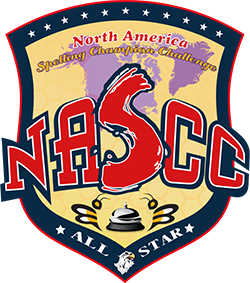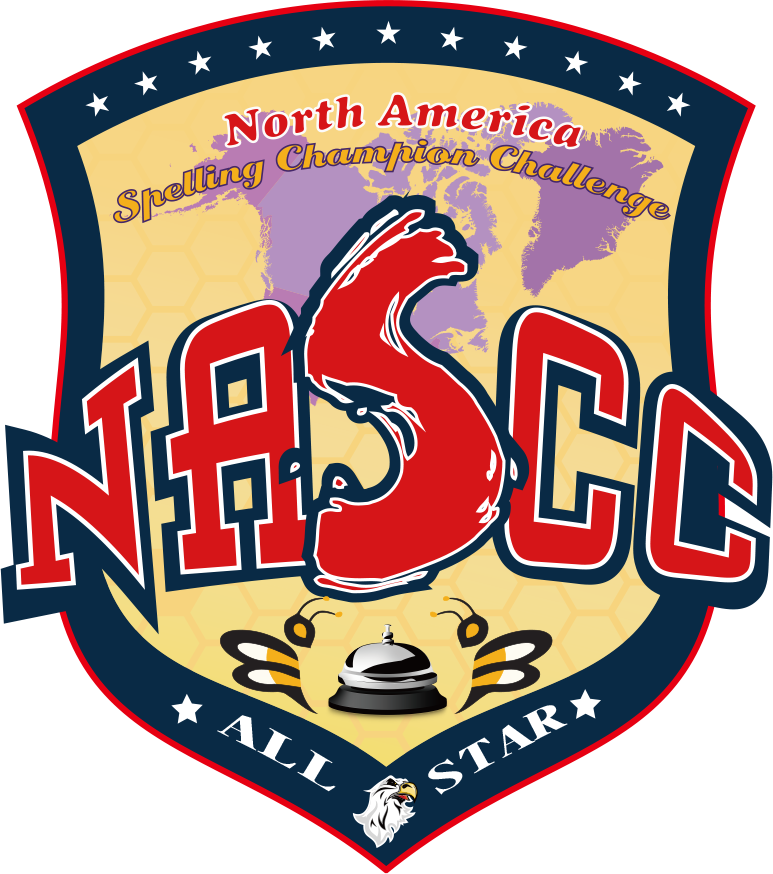![]() COMPETITION RULES
COMPETITION RULES
1. Competition format
The North America Spelling Champion Challenge is an oral spelling competition only. Spellers are not allowed to use pens, pencils, paper, or any other study materials. The bee follows the traditional American spelling bee format, with eliminations on a “miss-and-out” basis.
2. Word Sources
Words used in the North America Spelling Champion Challenge shall be selected from the website Merriam-Webster Unabridged (http://unabridged.merriam-webster.com). Definitions may be taken from Merriam-Webster’s Online Learner’s Dictionary (http://learnersdictionary.com) for the sake of simplicity. Only spellings that are listed at Merriam-Webster Unabridged will be accepted as correct. No other spellings from other dictionaries will be accepted as correct.
3. Spelling Format
In competition, after the pronouncer gives the speller a word, the speller will be encouraged also to pronounce the word before spelling it and after spelling it. For example, if the speller is given the word apple, the speller is encouraged to say, “Apple. A-P-P-L-E. Apple.” However, no speller will be eliminated for failing to pronounce a word.
4. English Alphabet
Spellers will only be judged by the 26 letters in the English alphabet. No speller will be eliminated for failing to note the capitalization of a word, a hyphen, a space, or any other form of punctuation or diacritic mark.
5. Retracing Letters
A speller may stop spelling in the middle of a word and start over, but there can be no change of letters or their sequence from those first given. If letters or their sequence are changed in the respelling, the speller will be eliminated.
6. British Variants
Words that are spelled according to variant spellings listed as British will be accepted as correct.
7. Misunderstood Sounds
Every speller is encouraged to pronounce each letter as clearly as possible. Any letter that is slurred, too quiet, or otherwise misunderstood by the judges will be construed as a misspelling, and the speller will be eliminated.
8. Word Information
A speller may ask the following information from the pronouncer:
- to pronounce the word
- the definition of the word
- the part of speech of the word
- to use the word in a sentence
- the language origin/etymology/derivation of a word
- repetition of any of these questions
If the pronouncer believes certain information may be especially helpful, the pronouncer may offer that information without being asked. The pronouncer shall answer all questions until the judges agree that the word has been made reasonably clear to the speller. The judges may disqualify any speller who ignores a request to start spelling.
9. Root Word Questions
If the speller believes the word may contain a root word, s/he may ask a root word question as long as it contains three pieces of information: 1) the root word, 2) the meaning of the root word, and 3) the root word’s original language. Without all three pieces of information, the pronouncer will have to decline the question. Root word questions will only be entertained during the NASCC championship finals; no root word questions will be entertained during the age group semifinals or finals.
10. Time Limit
During the semifinals, there is a time limit of one minute (60 seconds) from the time a speller is given a word. During the finals, this time limit is one and a half minutes (90 seconds). If a speller fails to finish spelling a word correctly within the time limit, s/he will be eliminated.
11. Homonyms
If a word has one or more homonyms (words with similar pronunciations but different spellings – for example, meet and meat), the pronouncer will indicate which word is to be spelled. If the listed word is not identified as a homonym, either by defining it or by distinguishing the homonyms, any correct spelling of any homonym of the word will be accepted as correct.
12. Elimination
Upon missing the spelling of a word, the speller is eliminated from the bee immediately, except as in rules 14, 15 and 16. The next word on the pronouncer’s list is given to the next speller.
13. Semifinals, 1
Spelling will proceed only until there are 10 spellers left. The top 10 semifinalists will qualify for the finals in their age group.
14. Semifinals, 2
If a round ends with fewer than 10 spellers, those who were not eliminated will automatically qualify for the finals. The spellers eliminated in that round will have a spell-off until 10 spellers have qualified.
15. Finals and championship rounds, 1
If only one speller at the end of a round has spelled a word correctly, that speller will be given one more word to spell. If the word is spelled correctly, that speller will be declared the champion. However, if that speller misspells the word, all spellers in the previous round will be reinstated.
16. Finals and championship rounds, 2
If all spellers in a round misspell their word, all will be reinstated, and spelling will proceed in the original order.
17. Ranking
Spellers will be ranked strictly in the order in which they were eliminated.
18. Protests
Any question relating to the spelling of a word should be referred to the judges ideally within that round. The official deadline for filing a protest is before the speller affected would have received their next word if they had stayed in the competition. No protest will be entertained after that word has been given to another speller. When only two or three spellers remain, a protest must be made immediately. No protests will be entertained after the conclusion of the bee. The judges are in complete control of the bee. Their decision shall be final on all questions.
19. Audience Assistance
Members of the audience should not give any clues to the speller about the spelling of the word. If an audience member is identified trying to give clues to a speller, that member may be asked to leave the audience, and the speller may be eliminated.
20. Speller Concerns While on Stage
Spellers who need to use the restroom or have other concerns can notify a staff member, who will escort them off stage. It is recommended that spellers use the bathroom only shortly after they spell. If a speller is not on stage when it is time to spell, s/he may be eliminated.
21. Behavior Issues
Any speller on stage behaving in a disruptive manner may be eliminated, regardless of whether they have spelled or not.

